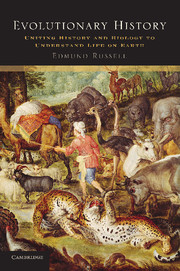Book contents
- Frontmatter
- Contents
- Figures
- Tables
- Preface
- Acknowledgments
- 1 Matters of Life and Death
- 2 Evolution's Visible Hands
- 3 Hunting and Fishing
- 4 Eradication
- 5 Altering Environments
- 6 Evolution Revolution
- 7 Intentional Evolution
- 8 Coevolution
- 9 Evolution of the Industrial Revolution
- 10 History of Technology
- 11 Environmental History
- 12 Conclusion
- Note on Sources
- Glossary
- Notes
- Index
4 - Eradication
Published online by Cambridge University Press: 05 June 2012
- Frontmatter
- Contents
- Figures
- Tables
- Preface
- Acknowledgments
- 1 Matters of Life and Death
- 2 Evolution's Visible Hands
- 3 Hunting and Fishing
- 4 Eradication
- 5 Altering Environments
- 6 Evolution Revolution
- 7 Intentional Evolution
- 8 Coevolution
- 9 Evolution of the Industrial Revolution
- 10 History of Technology
- 11 Environmental History
- 12 Conclusion
- Note on Sources
- Glossary
- Notes
- Index
Summary
I run most mornings with a dog named Riley. We have worked out a clear division of labor: he defecates, and I clean up. Riley takes his role very seriously. Picking the location to make his deposit seems to be the most important decision of his day, for he takes great care to sniff out precisely the spot he thinks best, does his business, and draws attention to his feat by scratching up big wads of grass. Then I ruin his achievement by slipping a plastic bag over my hand, picking up the deposit, tying the bag, and tossing this canine gold into a trash bin. I try to minimize hand-feces contact, but tears in the bags (they previously held newspapers or groceries) lead to failures. Dogs can transmit some nasty germs in their feces, such as Salmonella bacteria that cause human gastroenteritis. So when I get home, I wash my hands with soap and water, and perhaps I cause some evolution by selecting for strains of bacteria resistant to a chemical called triclosan in antibacterial soap.
My hand washing is one example of a larger human enterprise that has driven evolution: efforts to eradicate organisms. Although hunters and fishers kill animals, they like having the species they target around – the more abundant the better. Eradicators bring the opposite sentiment to their task. Eradication has various meanings. Here I use it to mean the elimination of a species from a certain place.
- Type
- Chapter
- Information
- Evolutionary HistoryUniting History and Biology to Understand Life on Earth, pp. 31 - 41Publisher: Cambridge University PressPrint publication year: 2011

